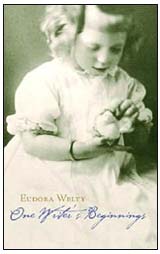Books |
Eudora Welty: One Writer’s Beginnings
By
Published: Feb 12, 2018
Category:
Memoir
Harper Lee, Harper Lee, Harper Lee — you’d think there was no other female writer in the South to care about. But if you drive from Monroeville, Alabama for just three-and-a-half hours, you’ll find yourself in Jackson, Mississippi, where Eudora Welty grew up. Take a deep breath. You’re about to be rewarded for making the trip.
Eudora Welty won the Pulitzer Prize and the American Book Award, and she is generally considered among the three or four female American writers of the last century whose fiction is likely to endure.
I doubt most of you have read any of her stories and novels.
No shame — Welty’s the one they overlook in school. Because she was, as a person, so innately modest, she made no big push for bestseller status or fame. And since her death, a cult did not spring up.
But if you can stand to read just 100 pages, you’ll feel you know Welty as well as if you’d written your thesis on her. Much more to the point: You will acquire, or be reminded of, a remarkable way to know yourself. “One Writer’s Beginnings” isn’t a book only writers can appreciate — it’s a life manual for remembering more and seeing more. It’s about becoming your best self and living your best life, just like the self-help gurus used to promise on Oprah. With the small difference that Welty’s way is likely to pay off. [To buy the paperback from Amazon, click here. To buy the audio CD, read by the author, from Amazon, click here. To buy “The Collected Stories of Eudora Welty” from Amazon, click here. To buy “Eudora Welty: Complete Novels: The Robber Bridegroom, Delta Wedding, The Ponder Heart, Losing Battles, The Optimist’s Daughter” from Amazon, click here.]
In form, “One Writer’s Beginnings” is a series of three lectures that Welty gave at Harvard in 1983. She was 74 years. The road behind was longer than the road ahead. So her topic was memory, “the treasure most dearly regarded by me, in my life and in my work as a writer.”
She begins in Jackson, Mississippi, where, as a girl, she would listen to her parents whistle “The Merry Widow” to one another in the morning as she — get this — buttoned her shoes. This is a world of grandfather clocks and train schedules, of a mother who read to her daughter at any time of day, of sets of Dickens. And it’s a world of stories, people talking to one another and a kid trying to figure out what they mean — take away the props, upgrade the technology, and it could be your childhood.
Welty is such a fine writer that hardly a page goes by without a terrific anecdote. Her mother, near death after childbirth, was saved because her father found, 40 miles north, a bottle of champagne. What it was like to Visit her father’s office after Sunday school. Soon enough, you can hear the voices…
In the second lecture, the Welty family takes a summer auto trip to visit relatives in West Virginia and Ohio. This trip prompts memories of her parents: how they met, what they overcame, what it cost. And, more, their beginnings. Her father was seven when his mother died. On the day of her death, she wrote a note — it could have held her last words — that he saved all his life: “I want you to be a good boy and meet me in heaven.” Her mother’s father? Died when she was young.
All the memories come together in the third lecture. For here Welty is old enough to go to college, then to think seriously about a writing career. And here she remembers — by now, you get that these memories are dropped with exquisite precision — that her father was the one who bought her first dictionary and her mother was the one who “emotionally and imaginatively” supported her dream of writing. Bless them, she’s ready.
Moving to her conclusion, she names the crucial thing:
Greater than scene, I came to see, is situation. Greater than situation is implication. Greater than all of these is a single, entire human being, who will never be confined in any frame.
One person. All her life of reading and writing and learning, and this is what she’s learned. One person.
When you get there, you will understand the book’s breathtaking last line: “All serious daring starts from within.”
I encourage you to get there.
BONUS WELTY
Eudora Welty was so angry about Medgar Evers’ assassination in Jackson on June 12, 1963, that she sat down that night and wrote a short story inn the voice of the killer. From in a New Yorker piece about that story: “Welty’s story was so accurate, her characterization of the murderer so precise, that The New Yorker changed several important details: Medgar Evers became Roland Summers, the time of the shooting shifted to a few hours after midnight, and Jackson became the nonexistent Thermopylae.” How could she describe the mind of the assassin so precisely? “What I was writing about really was that world of hate I felt I had grown up with. I felt I could speak as someone who knew it.” To read Welty’s story, click here.
for Deborah Shriver


